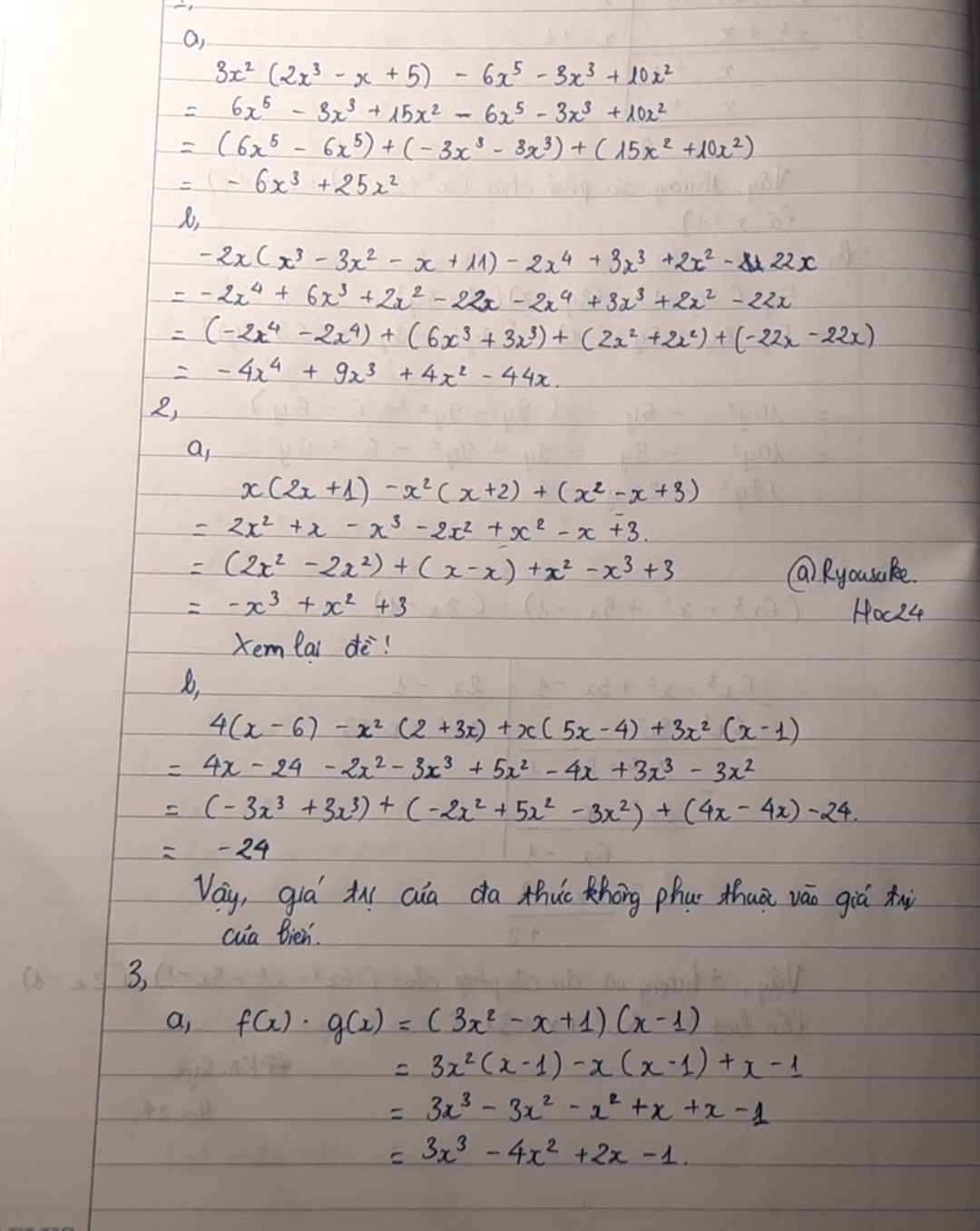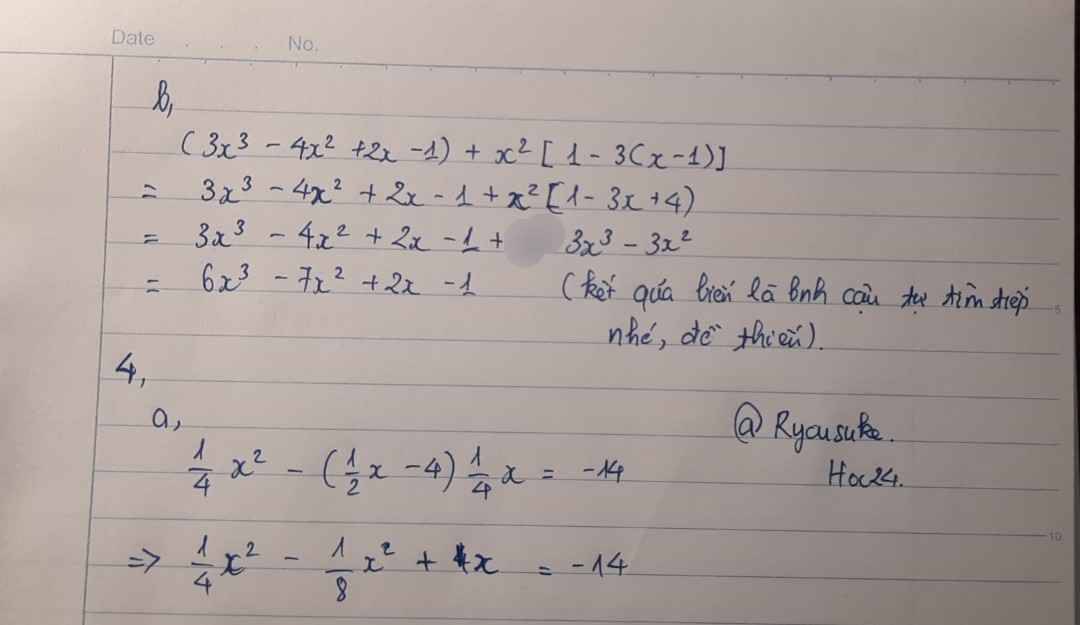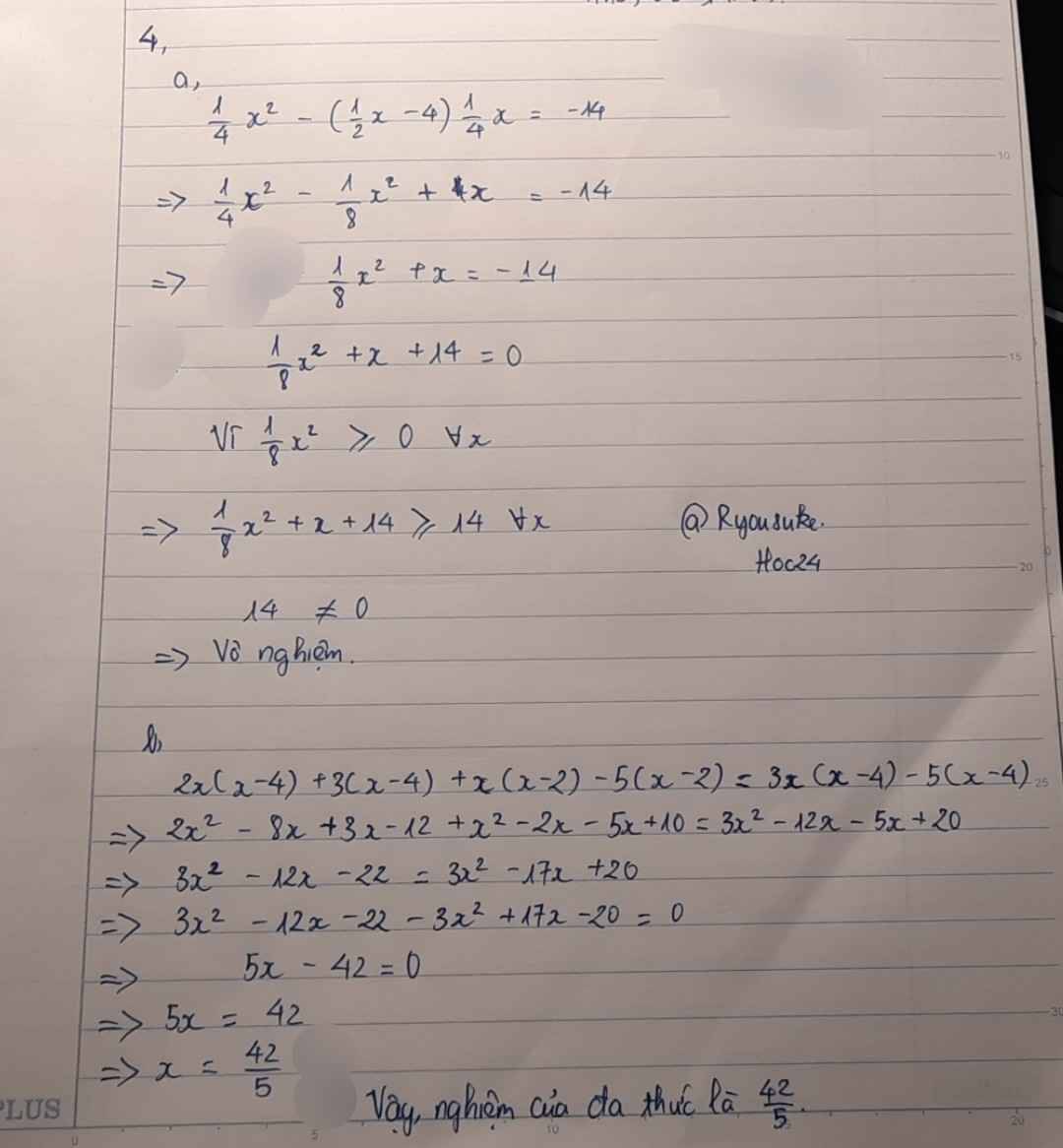(x - 1)3 - (x + 2)(x2 - 2x + 4) + 3x2 - 3x

Những câu hỏi liên quan
a) x(4x+3y)−(y−2x)2
b) (3+x)(x−3)−(x−1)(x2−3)
c)−2(x−3)2+(x+1)(5x−1)
d) (2x+1)(4x2−2x+1)−3x2(x−2)
e) (3x2+19x+20):(3x+4)
f) (7x2+x3+12x−6):(x2+4x−3)
\(a,=4x^2+3xy-y^2+4xy-4x^2=7xy-y^2\\ b,=x^2-9-x^3+3x+x^2-3=-x^3+2x^2+3x-12\\ c,=-2x^2+12x-18+5x^2+4x-1=3x^2+16x-19\\ d,=8x^3+1-3x^3+6x^2=5x^3+6x^2+1\\ e,=\left(3x^2+4x+15x+20\right):\left(3x+4\right)\\ =\left(3x+4\right)\left(x+5\right):\left(3x+4\right)\\ =x+5\\ f,=\left(x^3+4x^2-3x+3x^2+12x-9+3x+3\right):\left(x^2+4x-3\right)\\ =\left[\left(x^2+4x-3\right)\left(x+3\right)+3x+3\right]:\left(x^2+4x-3\right)\\ =x+3\left(dư.3x+3\right)\)
Đúng 1
Bình luận (0)
Bài 1: Rút gọn biểu thức sau:a. 3x2(2x3- x+5) - 6x5-3x3+10x2b. -2x(x3-3x2-xx+11)-2x4+3x3+2x2-22x2xBài 2: Chứng minh biểu thức sau không phụ thuộc vào x:a. x(2x+1)-x2(x+2)+(x2-x+3)b. 4(x-6)-x2(2+3x)+x(5x-4)+3x2(x-1)Bài 3: Cho đa thức: f(x)3x2-x+1 g(x)x-1a. Tính f(x).g(x)b. Tìm x để f(x).g(x)+x2[1-3g(x)]Bài 4: Tìm x:a. dfrac{1}{4}x2-(dfrac{1}{2}x-4)dfrac{1}{2}x-14b. 2x(x-4)+3(x-4)+x(x-2)-5(x-2)3x(x-4)-5(x-4)Các bạn giúp mik giải bt nha. Cảm ơn mn nhiêu ạ.
Đọc tiếp
Bài 1: Rút gọn biểu thức sau:
a. 3x2(2x3- x+5) - 6x5-3x3+10x2
b. -2x(x3-3x2-xx+11)-2x4+3x3+2x2-22x2x
Bài 2: Chứng minh biểu thức sau không phụ thuộc vào x:
a. x(2x+1)-x2(x+2)+(x2-x+3)
b. 4(x-6)-x2(2+3x)+x(5x-4)+3x2(x-1)
Bài 3: Cho đa thức: f(x)=3x2-x+1
g(x)=x-1
a. Tính f(x).g(x)
b. Tìm x để f(x).g(x)+x2[1-3g(x)]=
Bài 4: Tìm x:
a. \(\dfrac{1}{4}\)x2-(\(\dfrac{1}{2}\)x-4)\(\dfrac{1}{2}\)x=-14
b. 2x(x-4)+3(x-4)+x(x-2)-5(x-2)=3x
(x-4)-5(x-4)
Các bạn giúp mik giải bt nha. Cảm ơn mn nhiêu ạ.
`@` `\text {Ans}`
`\downarrow`
Gửi c!



Đúng 5
Bình luận (1)
Bài 1:
a) \(3x^2\left(2x^3-x+5\right)-6x^5-3x^3+10x^2\)
\(=6x^5-3x^3+10x^2-6x^5-3x^3+10x^2\)
\(=10x^2+10x^2\)
\(=20x^2\)
b) \(-2x\left(x^3-3x^2-x+11\right)-2x^4+3x^3+2x^2-22x\)
\(=-2x^4+6x^3+2x^2-22x-2x^4+3x^3+2x^2-22x\)
\(=-4x^4+9x^3+4x^2-44x\)
Đúng 0
Bình luận (2)
4:
a: =>1/4x^2-1/4x^2+2x=-14
=>2x=-14
=>x=-7
b: =>2x^2-8x+3x-12+x^2-2x-5x+10=3x^2-12x-5x+20
=>3x^2-12x-2=3x^2-17x+20
=>5x=22
=>x=22/5
Đúng 1
Bình luận (0)
1) 5(x-3) (x-7)-(5x+1) (x-2)= -8
2) x(x+1) (x+2)-(x+4) (3x-5)= 84-5x
3) (9x2-5) (x+3)-3x2(3x+9)=(x-5) (x+4)-x(x-11)
4) (x2-4x+16) (x+4)-x(x+1) (x+2)+3x2=0
5) (8x+2) (1-3x)+(6x-1) (4x-10)=-50
6) (x2+2x+4) (2-x)+x(x-3) (x+4)-x2+24=0
7) (\(\dfrac{x}{2}\)+3) (5-6x)+(12x-2) (\(\dfrac{x}{4}\)+3)=0
1) Ta có: \(5\left(x-3\right)\left(x-7\right)-\left(5x+1\right)\left(x-2\right)=-8\)
\(\Leftrightarrow5\left(x^2-10x+21\right)-\left(5x^2-10x+x-2\right)=-8\)
\(\Leftrightarrow5x^2-50x+105-5x^2+9x+2+8=0\)
\(\Leftrightarrow-41x=-115\)
hay \(x=\dfrac{115}{41}\)
2) Ta có: \(x\left(x+1\right)\left(x+2\right)-\left(x+4\right)\left(3x-5\right)=84-5x\)
\(\Leftrightarrow x\left(x^2+3x+2\right)-\left(3x^2+7x-20\right)=84-5x\)
\(\Leftrightarrow x^3+3x^2+2x-3x^2-7x+20-84+5x=0\)
\(\Leftrightarrow x^3=64\)
hay x=4
3) Ta có: \(\left(9x^2-5\right)\left(x+3\right)-3x^2\left(3x+9\right)=\left(x-5\right)\left(x+4\right)-x\left(x-11\right)\)
\(\Leftrightarrow9x^3+27x^2-5x-15-9x^3-27x^2=x^2-x-20-x^2+11x\)
\(\Leftrightarrow-5x-15=10x-20\)
\(\Leftrightarrow-5x-10x=-20+15\)
\(\Leftrightarrow x=\dfrac{-5}{-15}=\dfrac{1}{3}\)
Đúng 1
Bình luận (0)
a) 2x2(x-2)+3x(x2-x-2)-5(3-x2)
b) (x-1)(x-3)-(4-x)(2x+1)-3x2+2x-5
c) (x4-x3-3x2+x+2):(x2-1)
Mọi người giải giúp em với
Giải phương trình1) 2x ( x – 3 ) + 5 ( x – 3 ) 02) ( x2 – 4 ) – ( x – 2 ) ( 3 – 2x ) 03) ( 2x – 1 )2 – ( 2x + 5 )2 114) ( 2x + 1 )2 ( 3x – 5 ) 4x2 – 15) 3x2 – 5x – 8 06) ( 2x + 1 )2 ( 3x – 5 ) 4x2 – 17) 3x2 – 5x – 8 08) left|x-5right|39) left|2x-5right|3-x10) left|2x+1right|left|x-1right|11) dfrac{5x+2}{6}-dfrac{8x-1}{3}dfrac{4x+2}{5}-512) dfrac{3x+2}{2}-dfrac{3x+1}{6}2x+dfrac{5}{3}
Đọc tiếp
Giải phương trình
1) 2x ( x – 3 ) + 5 ( x – 3 ) = 0
2) ( x2 – 4 ) – ( x – 2 ) ( 3 – 2x ) = 0
3) ( 2x – 1 )2 – ( 2x + 5 )2 = 11
4) ( 2x + 1 )2 ( 3x – 5 ) = 4x2 – 1
5) 3x2 – 5x – 8 = 0
6) ( 2x + 1 )2 ( 3x – 5 ) = 4x2 – 1
7) 3x2 – 5x – 8 = 0
8) \(\left|x-5\right|=3\)
9) \(\left|2x-5\right|=3-x\)
10) \(\left|2x+1\right|=\left|x-1\right|\)
11) \(\dfrac{5x+2}{6}-\dfrac{8x-1}{3}=\dfrac{4x+2}{5}-5\)
12) \(\dfrac{3x+2}{2}-\dfrac{3x+1}{6}=2x+\dfrac{5}{3}\)
1) Ta có: \(2x\left(x-3\right)+5\left(x-3\right)=0\)
\(\Leftrightarrow\left(x-3\right)\left(2x+5\right)=0\)
\(\Leftrightarrow\left[{}\begin{matrix}x=3\\x=-\dfrac{5}{2}\end{matrix}\right.\)
2) Ta có: \(\left(x^2-4\right)-\left(x-2\right)\left(3-2x\right)=0\)
\(\Leftrightarrow\left(x-2\right)\left(x+2\right)+\left(x-2\right)\left(2x-3\right)=0\)
\(\Leftrightarrow\left(x-2\right)\left(3x-1\right)=0\)
\(\Leftrightarrow\left[{}\begin{matrix}x=2\\x=\dfrac{1}{3}\end{matrix}\right.\)
3) Ta có: \(\left(2x-1\right)^2-\left(2x+5\right)^2=11\)
\(\Leftrightarrow4x^2-4x-1-4x^2-20x-25=11\)
\(\Leftrightarrow-24x=11+1+25=37\)
hay \(x=-\dfrac{37}{24}\)
Đúng 1
Bình luận (0)
5) Ta có: \(3x^2-5x-8=0\)
\(\Leftrightarrow3x^2+3x-8x-8=0\)
\(\Leftrightarrow3x\left(x+1\right)-8\left(x+1\right)=0\)
\(\Leftrightarrow\left(x+1\right)\left(3x-8\right)=0\)
\(\Leftrightarrow\left[{}\begin{matrix}x=-1\\x=\dfrac{8}{3}\end{matrix}\right.\)
8) Ta có: \(\left|x-5\right|=3\)
\(\Leftrightarrow\left[{}\begin{matrix}x-5=3\\x-5=-3\end{matrix}\right.\Leftrightarrow\left[{}\begin{matrix}x=8\\x=2\end{matrix}\right.\)
10) Ta có: \(\left|2x+1\right|=\left|x-1\right|\)
\(\Leftrightarrow\left[{}\begin{matrix}2x+1=x-1\\2x+1=1-x\end{matrix}\right.\Leftrightarrow\left[{}\begin{matrix}2x-x=-1-1\\2x+x=1-1\end{matrix}\right.\)
\(\Leftrightarrow\left[{}\begin{matrix}x=-2\\x=0\end{matrix}\right.\)
Đúng 1
Bình luận (0)
Bài 1: Tìm x:
1) (x-3)3 -( x-3)(x2+ 3x+9) +6( x+1)2+ 3x2 = -33
2) (X-3)( X2+ 3X+9) - X(X-2)( 2+X) = 1
3) (X+2)(X2 - 2X+4) – X(X-3)(X+3) = 26
a: Ta có: \(\left(x-3\right)^3-\left(x-3\right)\left(x^2+3x+9\right)+6\left(x+1\right)^2+3x^2=-33\)
\(\Leftrightarrow x^3-9x^2+27x-27-x^3+27+6x^2+12x+1+3x^2=-33\)
\(\Leftrightarrow39x=-34\)
hay \(x=-\dfrac{34}{39}\)
b: Ta có: \(\left(x-3\right)\left(x^2+3x+9\right)-x\left(x-2\right)\left(x+2\right)=1\)
\(\Leftrightarrow x^3-27-x^3+4x=1\)
\(\Leftrightarrow4x=28\)
hay x=7
c: Ta có: \(\left(x+2\right)\left(x^2-2x+4\right)-x\left(x-3\right)\left(x+3\right)=26\)
\(\Leftrightarrow x^3+8-x^3+9x=26\)
\(\Leftrightarrow x=2\)
Đúng 1
Bình luận (0)
Bài 1: Rút gọn các biểu thức: a.(x + 2)2 - (x + 4)2 + x2 - 3x + 1b.(2x + 2)2 - 4x(x + 2)c. (2x - 1)2 - 2(2x - 3)2 + 4 d. (3x + 2)2 + 2(2 + 3x)(1 - 2y) + (2y - 1)2 e. (x2 + 2xy)2 + 2(x2 + 2xy)y2 + y4 f. (x - 1)3 + 3x(x - 1)2 + 3x2(x -1) + x3 g. (2x + 3y)(4x2 - 6xy + 9y2) h. (x - y)(x2 + xy + y2) - (x + y)(x2 - xy + y2) n. (x2 - 2y)(x4 + 2x2y + 4y2) - x3(x – y)(x2 + xy + y2) + 8y3
Đọc tiếp
Bài 1: Rút gọn các biểu thức:
a.(x + 2)2 - (x + 4)2 + x2 - 3x + 1
b.(2x + 2)2 - 4x(x + 2)
c. (2x - 1)2 - 2(2x - 3)2 + 4
d. (3x + 2)2 + 2(2 + 3x)(1 - 2y) + (2y - 1)2
e. (x2 + 2xy)2 + 2(x2 + 2xy)y2 + y4
f. (x - 1)3 + 3x(x - 1)2 + 3x2(x -1) + x3
g. (2x + 3y)(4x2 - 6xy + 9y2)
h. (x - y)(x2 + xy + y2) - (x + y)(x2 - xy + y2)
n. (x2 - 2y)(x4 + 2x2y + 4y2) - x3(x – y)(x2 + xy + y2) + 8y3
a)A=3x(2/3x2-3x4)+(3x2)(x3-1)+(-2+9).x2-12
b)B=x(2x3+x+2)-2x2(x2+1)+x2-2x+1
c)C=x.(2x+1)-x2(x+2)+x3-x+3
a, \(A=2x^3-9x^5+3x^5-3x^2+7x^2-12=-6x^5+2x^3+4x^2-12\)
b, \(B=2x^4+x^2+2x-2x^3-2x^2+x^2-2x+1=2x^4-2x^3+1\)
c, \(C=2x^2+x-x^3-2x^2+x^3-x+3=3\)
Đúng 1
Bình luận (0)
Bài 1: Thực hiện phép tính:a) x(3x2 – 2x + 5) b) 1/3 x2 y2 (6x + 2/3x2 – y)c) ( 1/3x + 2)(3x – 6) d) ( 1/3x + 2)(3x – 6)e) (x2 – 3x + 1)(2x – 5) f) ( 1/2x + 3)(2x2 – 4x + 6)Bài 2: Tìm x, biết:a) 3(2x – 3) + 2(2 – x) –3 b) x(5 – 2x) + 2x(x – 1) 13c) 5x(x – 1) – (x + 2)(5x – 7) 6 d) 3x(2x + 3) – (2x + 5)(3x – 2) 8Bài 3: Chứng tỏ rằng giá trị của biểu thức sau không phụ thuộc vào giá trị của biến: a) A x(2x + 1) – x2 (...
Đọc tiếp
Bài 1: Thực hiện phép tính:
a) x(3x2 – 2x + 5) b) 1/3 x2 y2 (6x + 2/3x2 – y)
c) ( 1/3x + 2)(3x – 6) d) ( 1/3x + 2)(3x – 6)
e) (x2 – 3x + 1)(2x – 5) f) ( 1/2x + 3)(2x2 – 4x + 6)
Bài 2: Tìm x, biết:
a) 3(2x – 3) + 2(2 – x) = –3 b) x(5 – 2x) + 2x(x – 1) = 13
c) 5x(x – 1) – (x + 2)(5x – 7) = 6 d) 3x(2x + 3) – (2x + 5)(3x – 2) = 8
Bài 3: Chứng tỏ rằng giá trị của biểu thức sau không phụ thuộc vào giá trị của biến: a) A = x(2x + 1) – x2 (x + 2) + x3 – x + 3
b) B = (2x + 11)(3x – 5) – (2x + 3)(3x + 7) + 5
Bài 4: Tính giá trị của biểu thức
a) A = 2x( 1/2x2 + y) – x(x2 + y) + xy(x3 – 1) tại x = 10; y = – 1 10
b) B = 3x2 (x2 – 5) + x(–3x3 + 4x) + 6x2 tại x = –5
\(1,\\ a,=3x^3-2x^2+5x\\ b,=2x^3y^2+\dfrac{2}{9}x^4y^2-\dfrac{1}{3}x^2y^3\\ c,=x^2-2x+6x-12=x^2+4x-12\\ 2,\\ a,\Rightarrow6x-9+4-2x=-3\\ \Rightarrow4x=2\Rightarrow x=\dfrac{1}{2}\\ b,\Rightarrow5x-2x^2+2x^2-2x=13\\ \Rightarrow3x=13\Rightarrow x=\dfrac{13}{3}\\ c,\Rightarrow5x^2-5x-5x^2+7x-10x+14=6\\ \Rightarrow-8x=-8\Rightarrow x=1\\ d,\Rightarrow6x^2+9x-6x^2+4x-15x+10=8\\ \Rightarrow-2x=-2\Rightarrow x=1\)
Đúng 3
Bình luận (0)
\(3,\\ A=2x^2+x-x^3-2x^2+x^3-x+3=3\\ B=6x^2-10x+33x-55-6x^2-14x-9x-21=-76\)
Đúng 2
Bình luận (0)
Bài 4:
b: Ta có: \(B=3x^2\left(x^2-5\right)+x\left(-3x^3+4x\right)+6x^2\)
\(=3x^4-15x^2-3x^3+4x^2+6x^2\)
\(=-5x^2\)
\(=-5\cdot25=-125\)
Đúng 0
Bình luận (0)




















